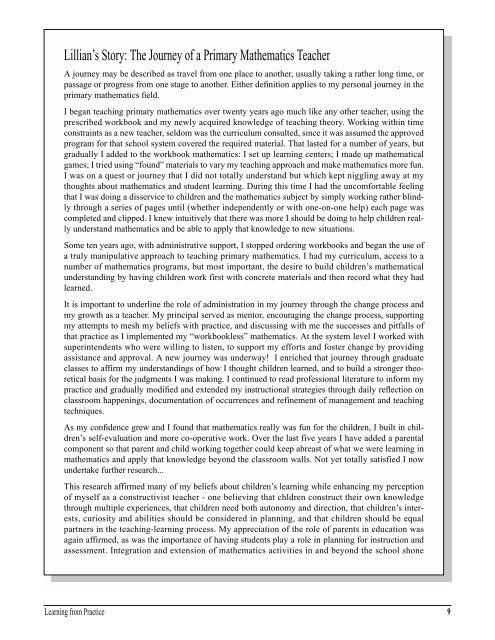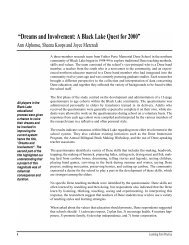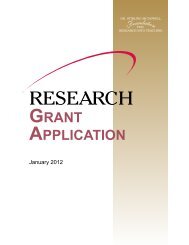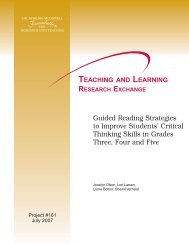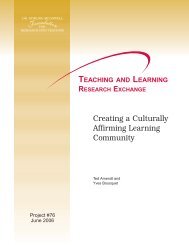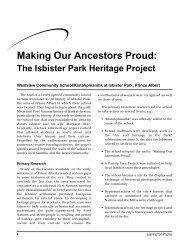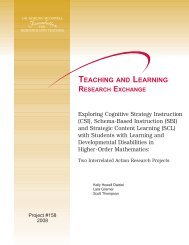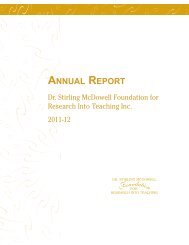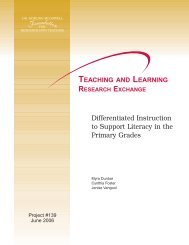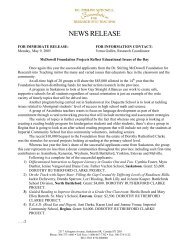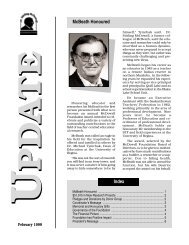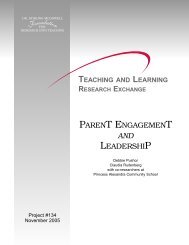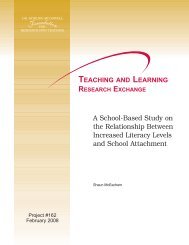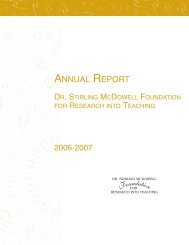Research Bulletin, Vol. 1, No. 2, 1996 - Dr. Stirling McDowell ...
Research Bulletin, Vol. 1, No. 2, 1996 - Dr. Stirling McDowell ...
Research Bulletin, Vol. 1, No. 2, 1996 - Dr. Stirling McDowell ...
Create successful ePaper yourself
Turn your PDF publications into a flip-book with our unique Google optimized e-Paper software.
Lillian’s Story: The Journey of a Primary Mathematics TeacherA journey may be described as travel from one place to another, usually taking a rather long time, orpassage or progress from one stage to another. Either definition applies to my personal journey in theprimary mathematics field.I began teaching primary mathematics over twenty years ago much like any other teacher, using theprescribed workbook and my newly acquired knowledge of teaching theory. Working within timeconstraints as a new teacher, seldom was the curriculum consulted, since it was assumed the approvedprogram for that school system covered the required material. That lasted for a number of years, butgradually I added to the workbook mathematics: I set up learning centers; I made up mathematicalgames; I tried using “found” materials to vary my teaching approach and make mathematics more fun.I was on a quest or journey that I did not totally understand but which kept niggling away at mythoughts about mathematics and student learning. During this time I had the uncomfortable feelingthat I was doing a disservice to children and the mathematics subject by simply working rather blindlythrough a series of pages until (whether independently or with one-on-one help) each page wascompleted and clipped. I knew intuitively that there was more I should be doing to help children reallyunderstand mathematics and be able to apply that knowledge to new situations.Some ten years ago, with administrative support, I stopped ordering workbooks and began the use ofa truly manipulative approach to teaching primary mathematics. I had my curriculum, access to anumber of mathematics programs, but most important, the desire to build children’s mathematicalunderstanding by having children work first with concrete materials and then record what they hadlearned.It is important to underline the role of administration in my journey through the change process andmy growth as a teacher. My principal served as mentor, encouraging the change process, supportingmy attempts to mesh my beliefs with practice, and discussing with me the successes and pitfalls ofthat practice as I implemented my “workbookless” mathematics. At the system level I worked withsuperintendents who were willing to listen, to support my efforts and foster change by providingassistance and approval. A new journey was underway! I enriched that journey through graduateclasses to affirm my understandings of how I thought children learned, and to build a stronger theoreticalbasis for the judgments I was making. I continued to read professional literature to inform mypractice and gradually modified and extended my instructional strategies through daily reflection onclassroom happenings, documentation of occurrences and refinement of management and teachingtechniques.As my confidence grew and I found that mathematics really was fun for the children, I built in children’sself-evaluation and more co-operative work. Over the last five years I have added a parentalcomponent so that parent and child working together could keep abreast of what we were learning inmathematics and apply that knowledge beyond the classroom walls. <strong>No</strong>t yet totally satisfied I nowundertake further research...This research affirmed many of my beliefs about children’s learning while enhancing my perceptionof myself as a constructivist teacher - one believing that chldren construct their own knowledgethrough multiple experiences, that children need both autonomy and direction, that children’s interests,curiosity and abilities should be considered in planning, and that children should be equalpartners in the teaching-learning process. My appreciation of the role of parents in education wasagain affirmed, as was the importance of having students play a role in planning for instruction andassessment. Integration and extension of mathematics activities in and beyond the school shoneLearning from Practice 9


